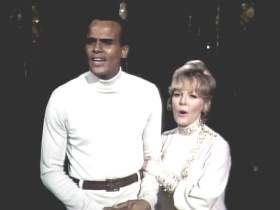Petula Clark, Harry Belafonte, and Mizhena
There is a computer game called Baldur’s Gate. It’s a fantasy adventure game based on Dungeons & Dragons, along the lines of Lord Of The Rings. An expansion for the game was released recently, and in that expansion there is a minor character named “Mizhena” who, if you engage with them and repeatedly ask them questions, will eventually tell you that they are transgender. If you are unfamiliar with Dungeons & Dragons, you might not realize that transgender characters have been a part of that game world for 30 or 40 years. It’s not new. It is, however, new to the Baldur’s Gate game.
As a result, a small segment of the Baldur’s Gate fan base revealed themselves to be vile bigots. These bigots created a “controversy”, objecting to the inclusion of this character in the game.
 This “controversy” comes at an interesting time. Today, April 8 2016, is the 48th anniversary of the broadcast of the Petula Clark Show on NBC. Petula Clark was a very popular singer at the time, having fifteen consecutive Top 40 hits in the USA, starting with “Downtown” in 1965. Clark was joined on her special by Harry Belafonte, who had made Calypso and Caribbean music popular throughout the world with his singing in the 1950s. During a duet toward the end of the show, Clark touched Belafonte briefly on the arm. Doyle Lott, a vice president from Chrysler, the show’s sponsor, was present at the taping. Lott objected to the “interracial touching”. He pressured NBC to remove the “forced” contact between Clark and Belafonte, to remove this “social justice” from the show. However, Petula Clark stuck to her guns, and the special was broadcast with the “controversial” touching. When the show aired, it received high ratings.
This “controversy” comes at an interesting time. Today, April 8 2016, is the 48th anniversary of the broadcast of the Petula Clark Show on NBC. Petula Clark was a very popular singer at the time, having fifteen consecutive Top 40 hits in the USA, starting with “Downtown” in 1965. Clark was joined on her special by Harry Belafonte, who had made Calypso and Caribbean music popular throughout the world with his singing in the 1950s. During a duet toward the end of the show, Clark touched Belafonte briefly on the arm. Doyle Lott, a vice president from Chrysler, the show’s sponsor, was present at the taping. Lott objected to the “interracial touching”. He pressured NBC to remove the “forced” contact between Clark and Belafonte, to remove this “social justice” from the show. However, Petula Clark stuck to her guns, and the special was broadcast with the “controversial” touching. When the show aired, it received high ratings.
It’s been over 40 years, and the Doyle Lotts of the world are still manufacturing controversies to defend their bigotry. I think it is right and just that people are enjoying the music of Petula Clark and Harry Belafonte to this very day, while Doyle Lott has been reduced to a footnote in the history of civil rights.
There are many cases where people of good will can and do disagree. That is usually the case, in my opinion. However, these cretins who wail and moan and gnash their teeth any time they see someone other than themselves represented are not people of good will. They are the bartender who says, “We don’t serve their kind here.” They are the prejudiced priest who refuses to heal the half-orc in the party. They are the pig-faced sheriff that says, “We don’t take kindly to outsiders around here.” They are the craven peasant accusing a midwife of witchcraft. They’re the corrupt king who doesn’t want the adventurers to fight the dragon because it’s never his daughter that gets sacrificed to it.
These are not people of good will. They are not defenders of the sanctity of gaming. They are, by their own choice and by their own hand, villains.
![[x]](/images/sigil_md.jpg) Blackmoor Vituperative
Blackmoor Vituperative